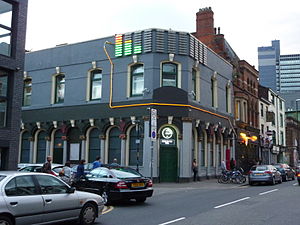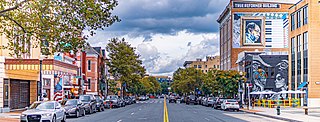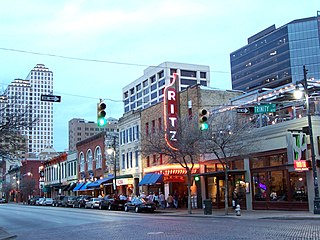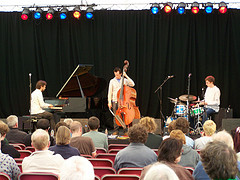
Band on the Wall is a live music venue in the Northern Quarter of Manchester, England.

Band on the Wall is a live music venue in the Northern Quarter of Manchester, England.
The building dates back to around 1862 when a local brewery, the McKenna Brothers, built it as the flagship pub of their operation. It was called the George and Dragon; the first licence on the site was granted to Elizabeth March in 1803. No-one knows when music started to be played at the venue but market pubs were well known for their musical connections, and the nearby Smithfield Markets [1] and textile factories ensured that this was a bustling area with many musicians and buskers. Manchester was then at its height as the first industrial city at the forefront of the Industrial Revolution.
The 'Band on the Wall' was a nickname from the 1930s when the landlord of the time Ernie Tyson placed a stage high on the far wall of the pub on which the musicians played. A regular band of two accordions, piano, drums, a singer and occasionally a saxophone would play.
During World War II the venue was popular with British, American, Canadian and French servicemen, as well as the local market traders and mill workers. Italian prisoners of war and deserters were rumoured to frequent the establishment. The band often played on during air raids, particularly as they became more common. Walter Greenwood wrote that a record 24,000 bottles of beer were sold here on one day of a Bank Holiday weekend. [2]


The area fell into decline during the middle of the 20th century as the textile manufacturing industry declined and many people left the area; the market was also suffering.
In 1975 local jazz musician Steve Morris and his business partner Frank Cusick bought the George & Dragon with the idea of turning it into a jazz club; a conversation with Johnny Roadhouse convinced them to name it the Band on the Wall. Jazz musicians from the local area as well as international artist played at the club. The late 1970s saw the emergence of a new sound, punk, and it was at the Band on the Wall that many of the Manchester punk bands played. This was part of the New Manchester Review nights, a fanzine and listings magazine which was the starting point for the now defunct City Life . Many notable post-punk bands played during this time including Buzzcocks and the Fall, amongst others. The venue was also used by the Manchester Musicians Collective. An album entitled A Manchester Collection was released by Object Records featuring some of those members in April 1979. Several other bands later released music through Factory Records, including Joy Division and A Certain Ratio. In 1982 the venue briefly closed for some internal redevelopment work. It was after the reopening that the Dizzy Gillespie logo was first used. It was during this decade that the venue began to gain an international reputation for so-called "World Music" and a programme that covered multiple genres. Performers who went on to gain international reputations included Mick Hucknall, who played on several occasions as Frantic Elevators. Other notable performances came from Purrkur Pillnikk, who supported The Fall for three dates in 1982, with supporting vocals from a young Björk. [3]
Band on the Wall is operated by Inner City Music Ltd, a registered charity. The organisation was awarded £3.2 million in July 2007, in combined awards by Arts Council England and the Heritage Lottery Fund as part of a £4 million project to transform the venue into a 21st-century centre for music.
The building was refurbished before reopening on 25 September 2009 with a performance by the venue's patrons Julian Joseph and Mica Paris. [4] [5]
On 18 June 2018, Inner City Music Ltd announced that Arts Council England had approved £1.65 million stage two capital funding for the venue's Bigger, Better, Stronger expansion plan. [6] [7] The plans included the renovation of the derelict Cocozza building, which adjoins the venue and the enlargement of the auditorium by demolishing the wall from which it derived its name.
On 3 March 2022, Band on the Wall reopened with a larger stage and increased capacity from 350 to 525. [8]
Brighter Sound, formerly known as GMMAZ (Greater Manchester Music Action Zone), is a creative music education company founded in 2000 which has their office at Band on the Wall. They run music projects at the venue and elsewhere for children and young people aged up to 19, work with emerging musicians and music practitioners, and deliver organisational development for companies that work with young people through music, across Manchester and the wider North. The young people who take part write their own material and develop their skills as songwriters, musicians and collaborators. Projects last for anything from a week to a year. Brighter Sound participants have performed at the nationwide Children in Need Choir in 2011 singing "Keep Holding On" by Avril Lavigne, the Lowry Theatre, and worked with musicians such as Elbow, Schlomo and Soweto Kinch. A project delivered as a partnership between Brighter Sound and Band on the Wall in 2012 provided opportunities for emerging musicians from across the UK to work with The Unthanks.
In 2009 Band on the Wall was named by the Brecon Jazz Festival as one of 12 venues which had made the most important contributions to jazz music in the United Kingdom, reflecting its history as one of Manchester's premier jazz venues and its current role in bringing music to new audiences. [9] It finished second in the voting for the inaugural award. [10]
In 2010, Band on the Wall's chairperson Kathy Dyson won a Parliamentary Jazz Award for her services to education, and music programmer Mike Chadwick won a silver Sony Award for his radio work. [11] Band on the Wall's website (and developers Cahoona) won a Big Chip Award in the 'not for profit' category. [12]
Band on the Wall was voted the 'Best Night Spot' at the 2010 Manchester Tourism Awards. [13]
In 2017, Band on the Wall won the award for 'Best Venue Teamwork' in the 'Arts Centre' subcategory at the Live UK Music Business Awards. [14]
Band on the Wall was voted the 'Best live venue' at the 2019 City Life Awards. [15]
In March 2019, Attitude is Everything awarded Band on the Wall an 'Accessibility Starts Online Award' in the 'Venue under 500 capacity' category. [16]
Pub rock is a subgenre of rock music that emerged in the early to mid-1970s in the United Kingdom. A back-to-basics movement, which incorporated roots rock, pub rock was a reaction against the expensively-recorded and produced progressive rock and flashy glam rock scenes at the time. Although short-lived, pub rock was played live in small traditional venues like pubs and clubs. Since major labels showed no interest in pub rock groups, pub bands sought out independent record labels such as Stiff Records. Indie labels used relatively inexpensive recording processes, so they had a much lower break-even point for a record than a major label.

CBGB was a New York City music club opened in 1973 by Hilly Kristal in the East Village in Manhattan, New York City. The club was previously a biker bar and before that was a dive bar. The letters CBGB were for Country, Bluegrass, Blues, Kristal's original vision for the club. But CBGB soon emerged as a famed and iconic venue for punk rock and new wave bands, including the Ramones, Television, Patti Smith Group, Blondie, Madonna and Talking Heads.

Washington, D.C., has been home to many prominent musicians and is particularly known for the musical genres of Jazz, Rhythm & Blues, bluegrass, punk rock and its locally-developed descendants hardcore and emo, and a local funk genre called go-go. The first major musical figure from District of Columbia was John Philip Sousa, a military brass band composer. Later figures include jazz musicians, such as Duke Ellington, Charlie Rouse, Buck Hill, Ron Holloway, Davey Yarborough, Michael A. Thomas, Butch Warren, and DeAndrey Howard; soul musicians, including Billy Stewart, The Unifics, The Moments, Ray, Goodman & Brown, Van McCoy, The Presidents, The Choice Four, Vernon Burch, guitarist Charles Pitts, and Sir Joe Quarterman & Free Soul.
The U.S. state of New Jersey is located in the Northeastern United States and is part of the Mid-Atlantic region.
Popular music of the United Kingdom in the 1970s built upon the new forms of music developed from blues rock towards the end of the 1960s, including folk rock and psychedelic rock movements. Several important and influential subgenres were created in Britain in this period, by pursuing the limitations of rock music, including British folk rock and glam rock, a process that reached its apogee in the development of progressive rock and one of the most enduring subgenres in heavy metal music. Britain also began to be increasingly influenced by third world music, including Jamaican and Indian music, resulting in new music scenes and subgenres. In the middle years of the decade the influence of the pub rock and American punk rock movements led to the British intensification of punk, which swept away much of the existing landscape of popular music, replacing it with much more diverse new wave and post punk bands who mixed different forms of music and influences to dominate rock and pop music into the 1980s.

Austin's official motto is the "Live Music Capital of the World" due to the high volume of live music venues in the city. Austin is known internationally for the South by Southwest (SXSW) and the Austin City Limits (ACL) Music Festivals which feature eclectic international lineups. The greatest concentrations of music venues in Austin are around 6th Street, Central East Austin, the Red River Cultural District, the Warehouse District, the University of Texas, South Congress, and South Lamar.

The 100 Club is a music venue located at 100 Oxford Street, London, England, where it has been hosting live music since 24 October 1942. It was originally called the Feldman Swing Club, but changed its name when the father of the current owner took over in 1964.
Manchester's music scene produced successful bands in the 1960s including the Hollies, the Bee Gees and Herman's Hermits. After the punk rock era, Manchester produced popular bands including Joy Division, New Order, The Smiths and Simply Red. In the late 1980s, the ecstasy-fuelled dance club scene played a part in the rise of Madchester with bands like the Stone Roses, Inspiral Carpets and Happy Mondays. In the 1990s, Manchester saw the rise of Britpop bands, notably Oasis.

The Brecon Jazz Festival is a music festival held annually in Brecon, Wales. Normally staged in early August, it has played host to a range of jazz musicians from across the world.

Bedouin Soundclash is a Canadian band based in Toronto and consisting of vocalist and guitarist Jay Malinowski, bass player Eon Sinclair and drummer Chuck Treece. Their sound has been described as a combination of reggae and ska. Bedouin Soundclash was formed in 2001, and has released six studio albums, most recently in 2022.

A music venue is any location used for a concert or musical performance. Music venues range in size and location, from a small coffeehouse for folk music shows, an outdoor bandshell or bandstand or a concert hall to an indoor sports stadium. Typically, different types of venues host different genres of music. Opera houses, bandshells, and concert halls host classical music performances, whereas public houses ("pubs"), nightclubs, and discothèques offer music in contemporary genres, such as rock, dance, country, and pop.
Bristol is a city in South West England. As the largest city in the region it is a centre for the arts and sport. The region has a distinct West Country dialect.

John David Robb is an English musician and journalist best known as the bassist and singer for the mid-1980s post-punk band the Membranes.

Deaf School is an English art rock/new wave band, formed in Liverpool, England, in January 1974.

The music of Cardiff has been dominated mainly by rock music since the early 1990s with later trends developing towards more extreme styles of the genre such as heavy metal and metalcore music. It, along with the nearby music scene in Newport, has brought a number of musicians to perform or begin their careers in South Wales.

The Culture of Manchester is notable artistically, architecturally, theatrically and musically. Despite being the 5th largest city in the United Kingdom by population and the second largest conurbation, Manchester has been ranked as the second city of the United Kingdom in numerous polls since the 2000s (decade), with an influential culture scene helping to elevate Manchester's importance in the national psyche. This has helped the city's population grow by 20% in the last decade, and made the universities the most popular choices for undergraduate admission.

The Bristol underground scene is a cultural movement in Bristol beginning in the early 1980s. The scene was born out of a lack of mainstream clubs catering for the emergence of hip hop music, with street and underground parties a mainstay. Crews formed playing hip hop in disused venues with sound systems borrowed from the reggae scene: City Rockers, 2 Bad, 2 Tuff, KC Rock, UD4, FBI, Dirty Den, Juice Crew, Rene & Bacus, Soul Twins, KC Rock, Fresh 4, and The Wild Bunch were among them. These names were the precursors to the more well known names that came from this scene. It is characterized by musicians and graffiti artists. The scene was influenced by the city's multiculturalism, political activism, and the arts movements of punk, reggae, hip hop, hippies and new age.
Birmingham's culture of popular music first developed in the mid-1950s. By the early 1960s the city's music scene had emerged as one of the largest and most vibrant in the country; a "seething cauldron of musical activity", with over 500 bands constantly exchanging members and performing regularly across a well-developed network of venues and promoters. By 1963 the city's music was also already becoming recognised for what would become its defining characteristic: the refusal of its musicians to conform to any single style or genre. Birmingham's tradition of combining a highly collaborative culture with an open acceptance of individualism and experimentation dates back as far back as the 18th century, and musically this has expressed itself in the wide variety of music produced within the city, often by closely related groups of musicians, from the "rampant eclecticism" of the Brum beat era, to the city's "infamously fragmented" post-punk scene, to the "astonishing range" of distinctive and radical electronic music produced in the city from the 1980s to the early 21st century.
Music in Leicester, England, has had a varied history. Leicester has several music venues and musical acts have originated in the city.

The Newport music scene, in and around Wales' third city, has been well documented and acclaimed for cultivating bands, singers, and famous music venues. Newport has been traditionally a rock city since the 1970s, but it has evolved over the years to include forms of punk, 1990s alt-rock, and more recently metal and hip-hop.